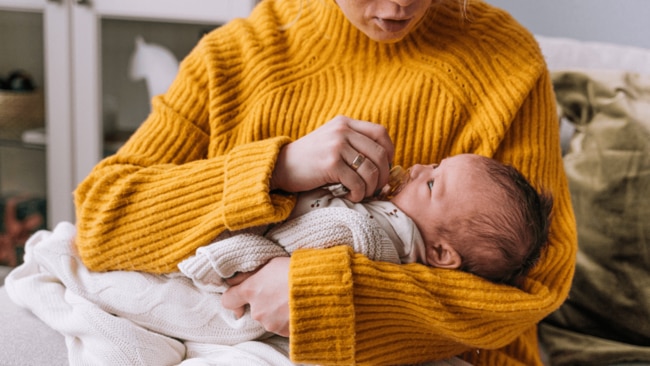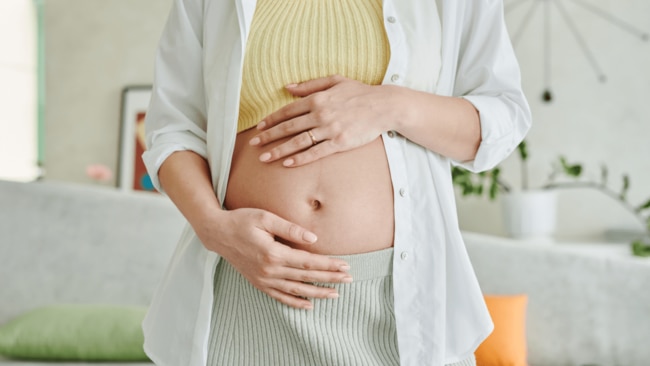Research shows a third of new mums diet to lose weight
The pressure to bounce back is real

Lifestyle
Don't miss out on the headlines from Lifestyle. Followed categories will be added to My News.
Researchers from Bond University found there were four key factors that influence body image dissatisfaction after having a baby.
After giving birth to a child, women often feel immense pressure to get back to their pre-pregnancy body shape and size. This pressure doesn't come from just one place; it comes from various parts of a woman's life and can seriously impact how she feels about herself.
A recent survey of mums in Australia found that a third of new mums were dieting to lose weight, and most were experiencing body image dissatisfaction. Our research also suggests the postpartum period is a time of high risk for developing or maintaining eating styles that may negatively impact psychological health and wellbeing.
To combat this, there is a vast need for providing education for new mothers about the benefits of intuitive eating which could positively influence their health and wellbeing. In a review of the research, we found four key factors that influence body image dissatisfaction after having a baby.
Like what you see? Sign up to our bodyandsoul.com.au newsletter for more stories like this.
Personal factors
Personal factors are at the centre of how women feel about their post-pregnancy bodies. These include worries about weight and body shape, how mental health and stress impact body image, and thoughts and actions related to their bodies.
Women often feel a lot of pressure to look a certain way according to what society expects, and this can make them unhappy with how they look and feel about themselves.
Social factors
Relationships with others are important in shaping how mums see their bodies after giving birth. The support they get from their partner, family, and friends can make them feel better or worse about their bodies.
Having people who encourage and help can make a mum feel more confident and better able to deal with the changes in her body. On the other hand, not having enough support can make her feel alone and not good enough, which can make body image issues even worse.

Institutional factors
The systems and institutions surrounding a new mum can also make a big difference in how she feels about her body after a baby. Her experiences with healthcare professionals, including how they address her concerns and what kind of help and resources are available, can greatly impact how she sees herself.
Additionally, going back to work after having a baby can bring its own set of challenges and stress. Juggling work, taking care of a baby and comparison with other women in the workplace can add to body image issues. This underlines how important it is to have supportive workplace policies and practices.
Societal factors
The larger society also plays a big role in shaping how women feel about their bodies after having a baby. Magazines, TV, and social media, often show a certain "ideal" post-baby body type.
These unrealistic standards can make new mums feel like they don't measure up. Additionally, societal norms about body image, which are reinforced through various channels, also affect how women view themselves during this time.

5 body image tips for new mums
Practice self-compassion
Be kind to yourself and acknowledge that your body has gone through significant changes during pregnancy and childbirth. Understand that it's normal for your body to change, and these changes don't diminish your worth.
Seek social support
Surround yourself with a strong support system of friends and family who can provide emotional support and encouragement. Sharing your feelings and experiences with loved ones can help reduce feelings of isolation and inadequacy.
Engage in self-care
Prioritise self-care activities that make you feel good about yourself. This can include taking time for relaxation, exercise, meditation, or any other activities that boost your mental and emotional well-being.
Challenge societal norms
Be critical of societal beauty ideals and unrealistic body standards. Remind yourself that these ideals don't reflect the diverse realities of postpartum bodies. Unfollow or limit exposure to media that promotes unrealistic body images.
Focus on health, not just appearance
Shift your focus from appearance to overall health. Concentrate on making healthy lifestyle choices that benefit your physical and mental well-being, rather than solely aiming to meet aesthetic goals.
To truly help women during the post-pregnancy period, it's important to take a comprehensive approach. This means improving education and policies related to prenatal and postnatal care. Women need resources and support to deal with mental health and body image concerns, and it's crucial to challenge and change societal norms that pressure women to strive for an unrealistic "thin ideal."
More Coverage
Originally published as Research shows a third of new mums diet to lose weight




